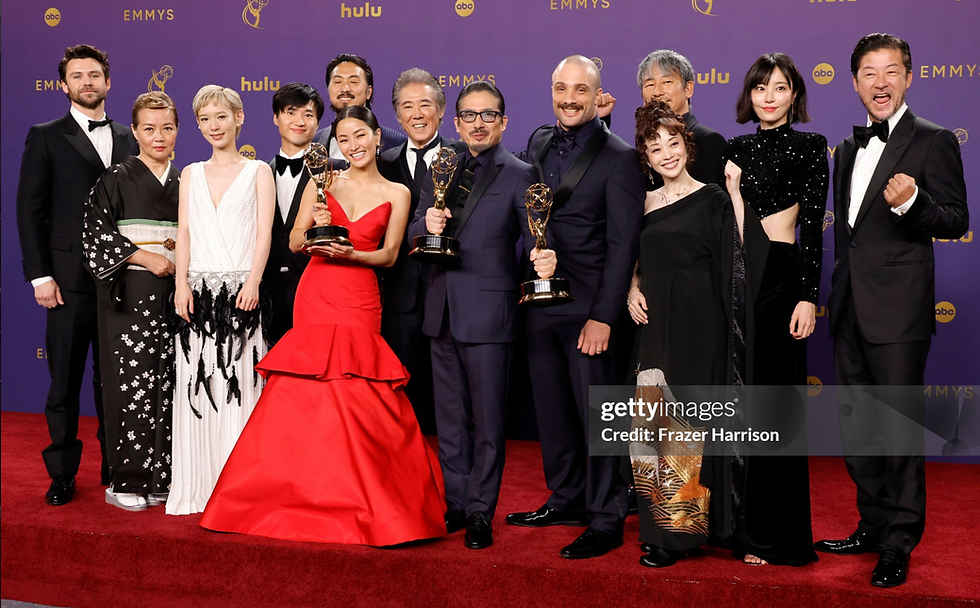‘Shogun’ Shatters Records with 18 Emmy Wins, Making History
- Sakura Yoshino
- Nov 6, 2024
- 4 min read
Updated: Feb 9

Harrison, Frazer. Getty Images, 15 Sep. 2024, Tommy Bastow, Yoriko Douguchi, Moeka Hoshi, Hiroto Kanai, Takehiro... Foto jornalística - Getty Images
FX’s Japanese series ‘Shogun,’ produced by and starring Hiroyuki Sanada, won a record number of prizes at the 76th Emmy Awards in the US, on September 15th, including Outstanding Drama Series, Lead Actor, and Lead Actress. The series made history with 18 awards, the most ever won by a single show in one year. A remarkable achievement was also accomplished by nine Japanese winners, the largest number in history!
Hiroyuki Sanada played the role of Toranaga Yoshii, a military commander modeled after Tokugawa Ieyasu, who was a Japanese samurai leader that reunified Japan at the beginning of the 17th century . Ieyasu created a new government controlled by the Tokugawa family that ruled Japan until 1868. In the Best Lead Actor category of Drama, he beat out Gary Oldman and Idris Elba, both well-known actors. Following Sanada, Anna Sawai won the Best Lead Actress award for her performance as Toda Balliko, an interpreter for the Englishman John Blackthorne-Anjin under Toranaga’s service. Sanada and Sawai are the first Japanese actors to secure victories in their respective categories.
The drama was not only recognized for the actors’ acting skills but also for the creativity and precise portrayal of the historical period. At the Creative Arts Emmy Awards, which are given to people mainly involved in production and technology, the series dominated 14 categories in total, including seven Japanese winners. This drama was created with a twist unlike any other produced in the past, and showed uncompromising attention to detail, with a thorough period study of everything from production sets to costumes, hair, sword fights, and gestures.
The first unique point is that the story isn’t about a White Savior. In “The Last Samurai” (2003), an American soldier played by Tom Cruise is hired as a military advisor in Japan at the end of the Edo period (1603-1868) and is eventually inspired by the samurai spirit of Ken Watanabe, becoming a leader of samurais against the government forces. In other words, it is a “white hero helping minorities” composition story, which is a very popular plot in Hollywood. Other examples include the 1962 film “Lawrence of Arabia,” in which a British soldier helps the Arab struggle for independence or “Dances with Wolves,” where a soldier helps the Native American Sioux tribe. These examples illustrate that in the Hollywood context, it is so ingrained to have a popular white actor as a hero who helps “culturally disadvantaged” ethnic groups and people. However, in ‘Shogun,’ the “white actor” is by no means the hero who solves everything. Therefore, it is a groundbreaking script that breaks the conventional Hollywood standard.
The second unique point is that 70% of the dialogue is in Japanese, with all the Japanese characters being played by Japanese actors, something that has never happened before in American dramas. In an Asian-oriented film, extras are usually recruited from the general Asian community, but in this production, even the minor roles were played by Japanese actors. As a result, even the extras in the series had a very authentic sense of historical drama, down to their movements and gestures. Another important aspect is the language used in the series, primarily communicated in Japanese. In the past, in Hollywood movies, Japanese, indigenous people, and every other type of different authenticity spoke in English, but now, with the diffusion of other language series, such as Korean drama and anime, and the success of series like Lupin and Squid Game, the linguistic diversity has become widespread in the United States.
The last and most important point is the significance of Hiroyuki Sanada as a producer in this project. Up to now, there have been many Hollywood movies and TV dramas that have left some viewers with a sense of uneasiness about Japan. These examples include “The Last Samurai” and “47 Ronin,” both period dramas depicting Japanese samurai culture. Hiroyuki Sanada, who appeared in “The Last Samurai” as an actor, is said to have moved to the U.S. and gradually proposed movies that correctly convey the Japanese culture and traditions, but no matter how much he and other actors may have said, “this is not right,” the director and producer hold absolute power for the production of the film, making it impossible to change the original script. Sanada’s perspective and the knowledge he had beforehand about his own culture made it possible to create a real period drama, attracting the attention of viewers all around the world.
During the Emmy Awards, Hiroyuki Sanada thanked his ancestors who have inherited the period drama and offered his greatest gratitude, saying, “The passion and dreams I inherited from you have crossed oceans and borders.” ‘Shogun’ is more than just a samurai drama — it has opened up new possibilities for many people beyond the storyline. This year’s Emmys has demonstrated once again what the series has to offer to the world. Hopefully, ‘Shogun’ will be the catalyst for many more authentic historical dramas to take root in the U.S. in the years to come.
Sources
Comments